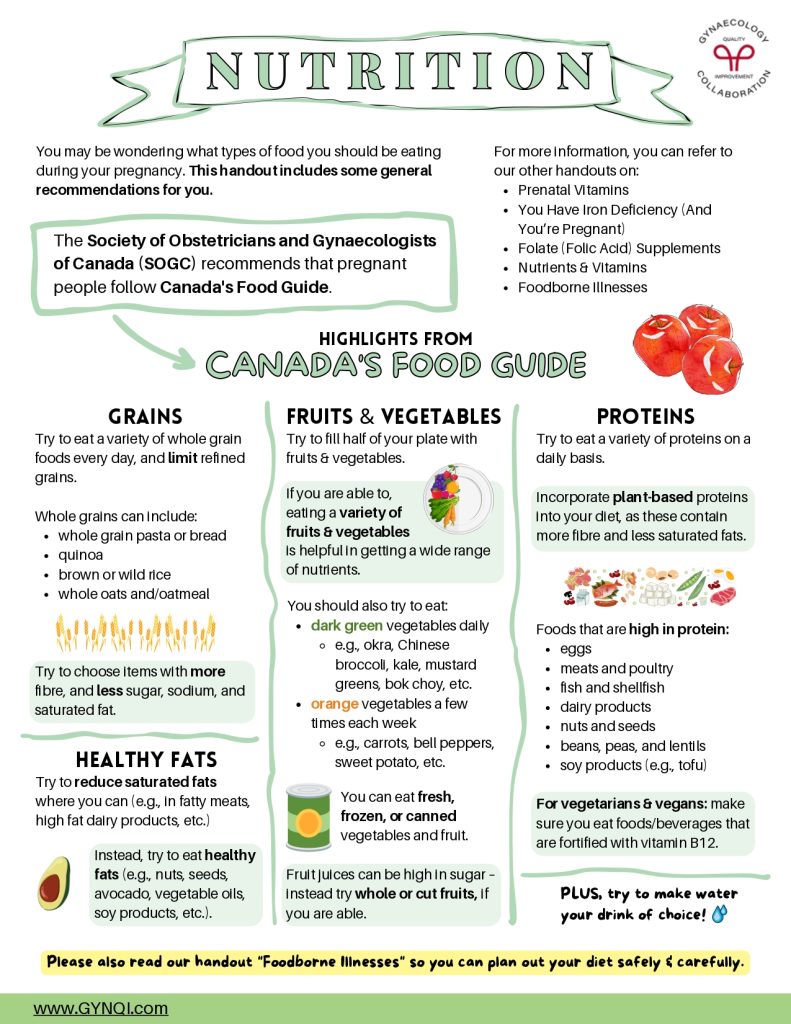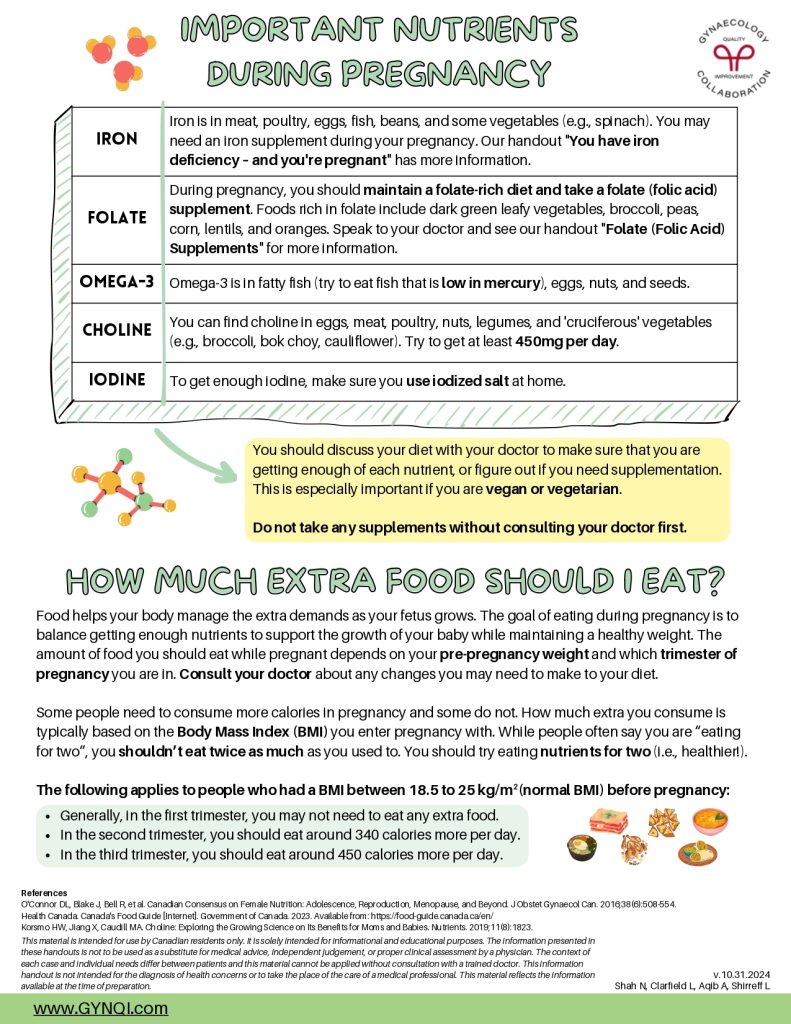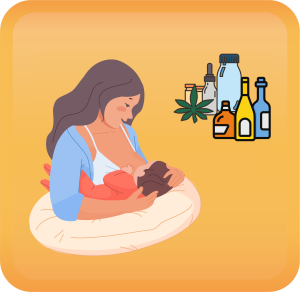
Nutrition
You may be wondering what types of food you should be eating during your pregnancy. This handout includes some general recommendations for you.
The Society of Obstetricians and Gynaecologists of Canada (SOGC) recommends that pregnant people follow Canada’s Food Guide.
For more information, you can refer to our other handouts on:
- Prenatal Vitamins
- You Have Iron Deficiency (And You’re Pregnant)
- Folate (Folic Acid) Supplements
- Nutrients & Vitamins
- Foodborne Illnesses
Highlights From Canada’s Food Guide
Grains
Try to eat a variety of whole grain foods every day, and limit refined grains.
Whole grains can include:
- whole grain pasta or bread
- Quinoa
- brown or wild rice
- whole oats and oatmeal
Try to choose items with more fibre, and less sugar, sodium, and saturated fat.
Healthy Fats
Try to reduce saturated fats where you can (e.g., in fatty meats, high fat dairy products, etc.) Instead, try to eat healthy fats (e.g., nuts, seeds, avocado, vegetable oils, soy products, etc.).
Fruits & Vegetables
Try to fill half of your plate with fruits & vegetables. If you are able to, eating a variety of fruits & vegetables is helpful in getting a wide range of nutrients.
You should also try to eat:
- Dark green vegetables daily
- e.g., okra, Chinese broccoli, kale, mustard greens, bok choy, etc.
- Orange vegetables a few times each week
- e.g., carrots, bell peppers, sweet potato, etc.
You can eat fresh, frozen, or canned vegetables and fruit. Fruit juices can be high in sugar. Instead try whole or cut fruits, if you are able.
Proteins
Try to eat a variety of proteins on a daily basis. Incorporate plant-based proteins into your diet, as these contain more fibre and less saturated fats.
Foods that are high in protein:
- Eggs
- meats and poultry
- fish and shellfish
- dairy products
- nuts and seeds
- beans, peas, and lentils
- soy products (e.g., tofu)
For vegetarians & vegans: make sure you eat foods/beverages that are fortified with vitamin B12.
PLUS, try to make water your drink of choice!
Please also read our handout “Foodborne Illnesses” so you can plan out your diet safely & carefully.
Important Nutrients During Pregnancy
| Iron | Iron is in meat, poultry, eggs, fish, beans, and some vegetables (e.g., spinach). You may need an iron supplement during your pregnancy. Our handout “You have iron deficiency – and you’re pregnant” has more information. |
| Folate | During pregnancy, you should maintain a folate-rich diet and take a folate (folic acid) supplement. Foods rich in folate include dark green leafy vegetables, broccoli, peas, corn, lentils, and oranges. Speak to your doctor and see our handout “Folate (Folic Acid) Supplements” for more information. |
| Omega-3 | Omega-3 is in fatty fish (try to eat fish that is low in mercury), eggs, nuts, and seeds. |
| Choline | You can find choline in eggs, meat, poultry, nuts, legumes, and ‘cruciferous’ vegetables (e.g., broccoli, bok choy, cauliflower). Try to get at least 450mg per day. |
| Iodine | To get enough iodine, make sure you use iodized salt at home. |
You should discuss your diet with your doctor to make sure that you are getting enough of each nutrient, or figure out if you need supplementation. This is especially important if you are vegan or vegetarian.
Do not take any supplements without consulting your doctor first.
How Much Extra Food Should I Eat?
Food helps your body manage the extra demands as your fetus grows. The goal of eating during pregnancy is to balance getting enough nutrients to support the growth of your baby while maintaining a healthy weight. The amount of food you should eat while pregnant depends on your pre-pregnancy weight and which trimester of pregnancy you are in. Consult your doctor about any changes you may need to make to your diet.
Some people need to consume more calories in pregnancy and some do not. How much extra you consume is typically based on the Body Mass Index (BMI) you enter pregnancy with. While people often say you are “eating for two”, you shouldn’t eat twice as much as you used to. You should try eating nutrients for two (i.e., healthier!).
The following applies to people who had a BMI between 18.5 to 25 kg/m (normal BMI) before pregnancy:
- Generally, in the first trimester, you may not need to eat any extra food.
- In the second trimester, you should eat around 340 calories more per day.
- In the third trimester, you should eat around 450 calories more per day.




